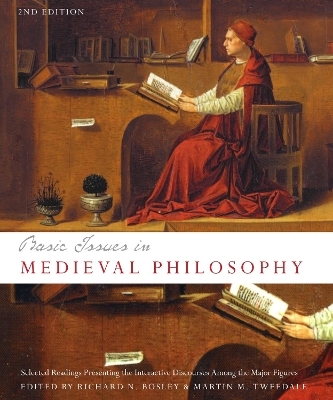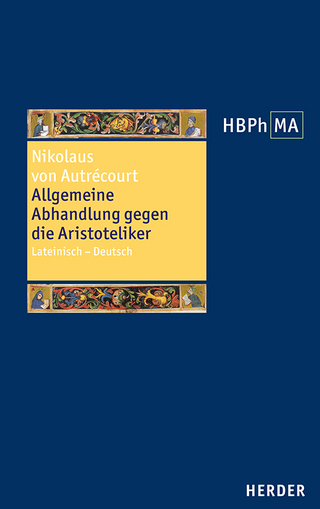
Basic Issues in Medieval Philosophy
Broadview Press Ltd (Verlag)
978-1-55111-715-7 (ISBN)
In this important collection, the editors argue that medieval philosophy is best studied as an interactive discussion between thinkers working on very much the same problems despite being often widely separated in time or place. Each section opens with at least one selection from a classical philosopher, and there are many points at which the readings chosen refer to other works that the reader will also find in this collection. There is a considerable amount of material from central figures such as Augustine, Abelard, Duns Scotus, and William of Ockham, as well as extensive texts from thinkers in the medieval Islamic world. Each selection is prefaced by a brief introduction by the editors, providing a philosophical and religious background to help make the material more accessible to the reader.
This edition, updated throughout, contains a substantial new chapter on medieval psychology and philosophy of mind, with texts from authors not previously represented such as John Buridan and Peter John Olivi.
Richard N. Bosley and Martin M. Tweedale are Professors Emeritus, Department of Philosophy at the University of Alberta.
Preface
Introduction
TOPIC I : NECESSITY, CONTINGENCY, AND CAUSATION
Introduction
I.1. Aristotle
The four Causes
Senses of the Necessary
Causation, Chance, and Spontaneity
Science and the Accidental
I.2. Avicenna
Two Kinds of Existents
Proof of the Necessary of Existence
What is Possible of Existence is Necessary of Existence from something else
Characteristics of the Necessary of Existence
I.3. Abelard
That God can only do what He does do
I.4. Al-Ghazali and Averroes
Whether the First Cause is simple
About the Natural Sciences
I.5. St. Thomas Aquinas
How absolute Necessity can exist in Created Things
That God does not will other things in a necessary way
Difficulties in the Concept of Will
I.6. Siger of Brabant
Commentary on Necessity
I.7. The Condemnation of 1277
Extending God’s Power
I.8. Henry of Ghent
The Finiteness of the World’s Past
I.9. John Duns Scotus
Proof of a First Cause
The First Cause causes contingently
The Omnipotence of God
Impossibility
Could God make things better than He does?
I.10. William of Ockham
Essentially ordered Causes
Can it be proved that there exists a first productive Cause?
Can it be proved that there exists a first conserving Cause?
Is God able to do Everything that it is possible for a Creature to do?
Can God do things which He neither does do nor will do?
Does not being able to do the Impossible belong to God before not being able to be done by Godbelongs to the Impossible?
Can God make a better world than this one?
TOPIC II : IS THERE AN INFINITELY PERFECT BEING?
Introduction
II.1. Aristotle
Why there must be an eternal Mover that is not itself in Motion
The first Mover has no Size
The Principle on which depend the Heavens and Nature
II.2. St. Anselm
The Being “a greater than which cannot be thought”
II.3. Al-Ghazali and Averroes
Can we prove that the First Being is incorporeal?
II.4. St. Thomas Aquinas
God’s Existence is not self-evident to us
The five Ways
A Being which just is its own Existence
II.5. John Duns Scotus
The first efficient Cause has infinite Power
The Infinity of the most excellent Being
II.6. William of Ockham
Why the first efficient Cause cannot be proved to have infinite Power
Why it cannot be proven that the most perfect Being is infinite in Perfection
Aristotle did not intend to prove the Infinity of the First Cause
TOPIC III : COULD THE WORLD BE ETERNALLY EXISTENT?
Introduction
III.1. Aristotle
Did Motion ever have a Beginning? Will it ever end?
III.2. St. Augustine
What is Time?
How Creatures have always been but are not co-eternal with God
III.3. Al-Ghazali and Averroes
Is the Doctrine of the “Philosophers” as regards the Production of the World coherent?
III.4. Moses Maimonides
Arguments of the Mutakallemim purporting to show that the Universe was created out of nothing
Different views on the Eternity of the Universe among those who believe God exists
That the Universe is eternal has not been proven
The view that God has produced the Universe from all Eternity and how it is to be evaluated
III.5. St. Thomas Aquinas
That it is not necessary for Creatures to have existed always
That God could have created an eternal World
III.6. Henry of Ghent
That a created thing cannot have existed from Eternity
Contradictions involved in the view that God makes eternal things
III.7. John Duns Scotus
Arguments on both sides and their Refutations
III.8. William of Ockham
Could God make a World that has existed from Eternity?
TOPIC IV: DETERMINISM, FREE WILL, AND DIVINE FOREKNOWLEDGE
Introduction
IV.1. Aristotle
Determinism and the Truth of future contingent Statements
IV.2. Boethius
How can God know everything about the Future?
IV.3. St. Anselm
The Harmony of Foreknowledge and Free Will
IV.4. St. Thomas Aquinas
Does God’s Knowledge extend to Future Contingents?
IV.5. Siger of Brabant
How Contingency arises in the World
IV.6. John Duns Scotus
How God can know Future Contingents by knowing His own Will
IV.7. William of Ockham
Why Scotus’s Solution will not work
Propositions in the Present tense but about the Future
TOPIC V: IDENTITY AND DISTINCTION
Introduction
V.1. Aristotle
Senses of ‘same’
Senses of ‘One’
How the Motion of the Agent is the same as the Motion in the Recipient, yet different
V.2. Boethius
Sameness and Difference in the Trinity
V.3. Abelard
How to have many Persons in one God
V.4. John Duns Scotus
Qualified and unqualified Distinctions
V.5. William of Ockham
No formal Distinction without Real Distinction
TOPIC VI : UNIVERSALS AND PARTICULARS
Introduction
VI.1. Plato
A World based on Archetypes
VI.2. Aristotle
Categories and the things there are
Universals and Particulars
The Problem of Universals
Are first Principles Universals?
Substance and Universals
VI.3. Porphyry
The five “Predicables”
VI.4. Boethius
The “deeper Questions”
VI.5. Garlandus Compotista
The Predicables are just Utterances
VI.6. Abelard
The Existence and the Nature of Universals
Universals and Signification
What Propositions signify
VI.7. Avicenna
The Nature of Universals
The Essences of things
VI.8. John Duns Scotus
Natures are not of themselves individuated
What makes a Substance individual
Is a Universal something in things?
VI.9. William of Ockham
Universals and Distinction
The Distinction of First and Second Intentions
The Synonymy of Concrete and Abstract Nouns
Is a Universal a Singular?
Is every Universal a Quality of the Mind?
Is a Category made up of things outside the Mind or of Concepts of Things?
TOPIC VII : SKEPTICISM
Introduction
VII.1. St. Augustine
Arguments against Academic Skepticism
Internal Knowledge
Can we know there is something above Human Reason?
VII.2. Henry of Ghent
Knowledge requires Divine Illumination of the Mind
VII.3. Siger of Brabant
Some Judgments are to be trusted
VII.4. John Duns Scotus
Refutation of Henry and of Skepticism generally
VII.5. Nicholas of Autrecourt
Certainty and the Principle of Non-Contradiction
TOPIC VIII : VIRTUE AND REASON, SIN AND SEX
Introduction
VIII.1. Aristotle
Excellence (Virtue) and the Mean
Ethics and Deliberation
VIII.2. St. Augustine
What is the Supreme Good for Human Beings?
The Ultimate Good is not to be found in this Life
How Order pervades everything
The Works of Reason
Why Adultery is evil
Lust, a Penalty for the Original Sin
VIII.3. Al-Ghazali
Hope
Fear
VIII.4. Abelard
What Sin and Vice consist in
VIII.5. St. Thomas Aquinas
Goodness and Badness in outward Acts
Is Pleasure bad?
Is Enjoyment in the Thought of Fornication a Sin?
Why Lechery is a Sin
Sex in the Garden of Eden
TOPIC IX: THE “DARKNESS WHICH IS BEYOND INTELLECT”
Introduction
IX.1. Plotinus
The One that is the Source of Being
The Intelligence and its Relation to the Soul
IX.2. Pseudo-Dionysius the Areopagite
The Transcendent Good
How God can be called Wisdom
The Mystical Theology
The Divine Darkness
IX.3. John Scotus Eriugena
Things that are and things that are not
God as Hyper-being
God’s Diffusion into all things
The Return of the Many to the One
The three Motions of the Soul
The Indefinability of God
The Self-creation of the Divine Darkness
Man contains all Creatures
The Return of all things to God
IX.4. Ibn Tufail
The Experience of total Self-annihilation
IX.5. Meister Eckhart
On the Names of God
“God is One”
The Intellect perceives God bare of Goodness and Being
The “Negation of Negation”
The Attraction of the Soul to the One
“On Detachment”
TOPIC X: BODY, SOUL, AND INTELLECT
Introduction
X.1. Aristotle
What sort of accounts should we give in psychology?
Is there movement in the soul?
What type of entity is the soul?
What accounts for thinking and knowledge?
Is the intellect formed in the process of fetal generation?
X.2. Alexander of Aphrodisias
On the Intellect
X.3. Themistius
How to understand the potential and active intellects
X.4. Avicenna
What does Aristotle’s definition of the soul tell us?
Is the soul a substance?
How do there come to be many individual human souls?
Can the soul exist after the body has been destroyed?
How does the human intellect come to know abstract essences?
How does the intellect think?
How does the soul relate to its powers?
X.5. Averroes
The nature of the material intellect
The role of the agent intellect
X.6 Siger of Brabant and Thomas Aquinas
How does the intellect unite with the body?
Why the intellectual soul must be the form of the body
Why the Averroists are wrong
How Albert and Thomas go wrong
X.7 Peter John Olivi
Why the human soul cannot be the form of the body
X.8. John Buridan
In what way is the soul an actuality?
How many souls does an individual have?
Is the soul just its powers?
How many powers does the soul have?
Can the soul be spread throughout the body?
Is the intellect passive as regards its objects?
Can what knows something have the character of what it knows?
Three theories about the intellect
BIOGRAPHIES
GLOSSARY
SOURCES
BIBLIOGRAPHY
| Erscheint lt. Verlag | 30.5.2006 |
|---|---|
| Sprache | englisch |
| Maße | 191 x 229 mm |
| Gewicht | 1180 g |
| Themenwelt | Geisteswissenschaften ► Philosophie ► Philosophie des Mittelalters |
| ISBN-10 | 1-55111-715-0 / 1551117150 |
| ISBN-13 | 978-1-55111-715-7 / 9781551117157 |
| Zustand | Neuware |
| Haben Sie eine Frage zum Produkt? |
aus dem Bereich


